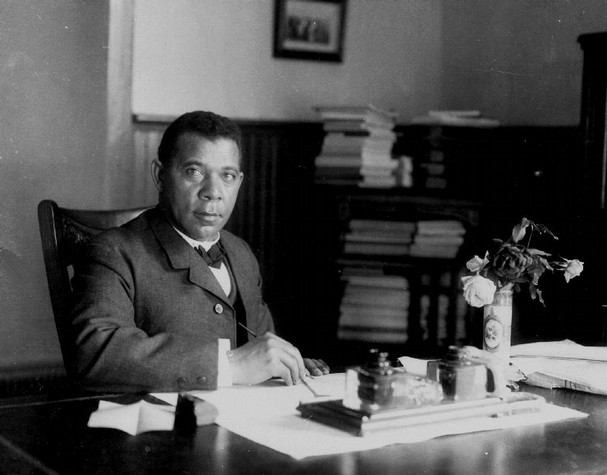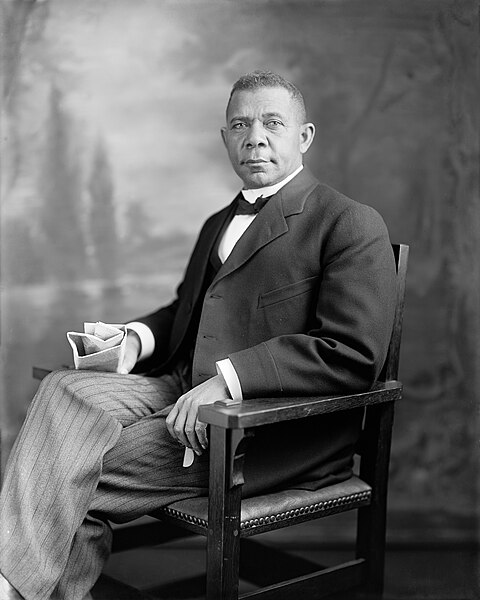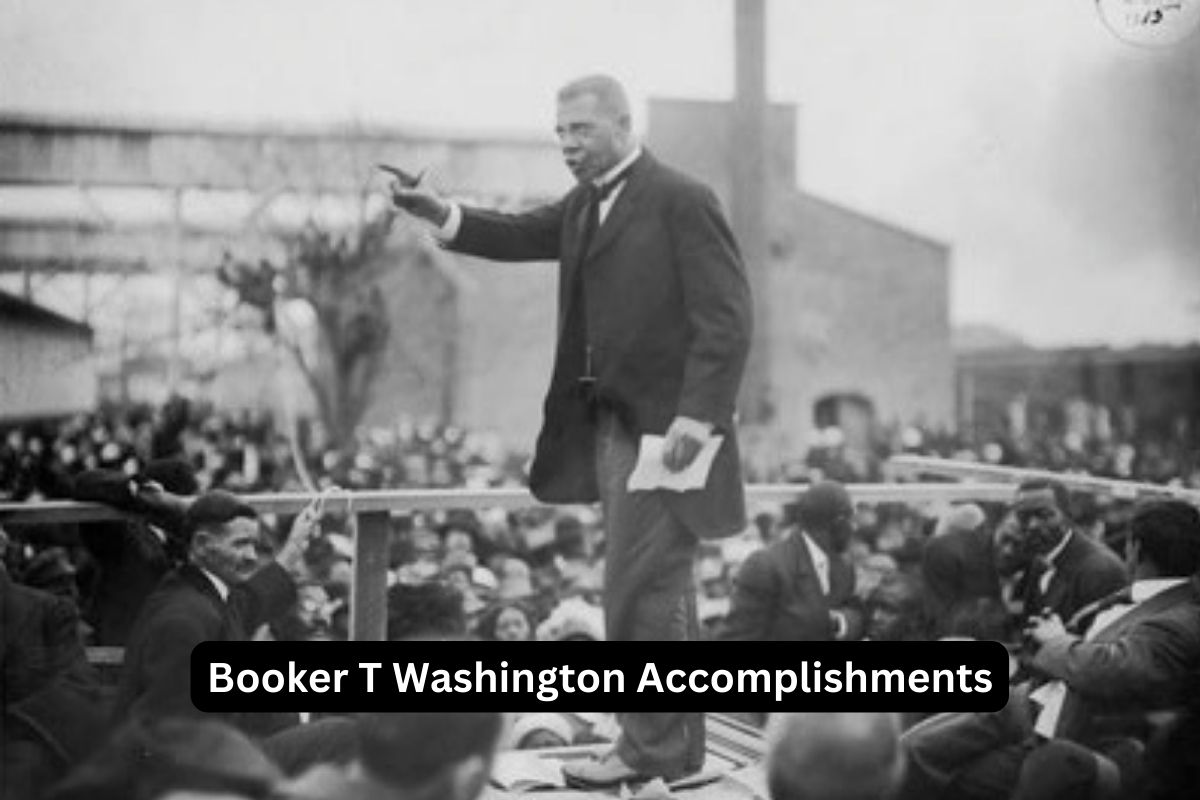Booker T. Washington was a prominent African American educator, author, and leader who made significant contributions to the advancement of African Americans in the late 19th and early 20th centuries.
He is best known for founding the Tuskegee Institute, promoting industrial education and vocational training, and delivering the influential Atlanta Compromise speech.
Through his writings, speeches, and leadership, Washington advocated for economic progress, self-reliance, and practical education as essential tools for African American empowerment.
Despite controversy surrounding his accommodationist approach, his work had a lasting impact on African American education, entrepreneurship, and the civil rights movement.
Accomplishments of Booker T Washington
1. Founding Tuskegee Institute
In 1881, Booker T. Washington established the Tuskegee Institute (now known as Tuskegee University) in Tuskegee, Alabama. The institute was a historically black college and aimed to provide practical education and vocational training to African Americans.
Also Read: Facts About Booker T Washington
Washington believed that education and skill development were crucial for African Americans to gain economic independence and social progress.
Under his leadership, Tuskegee Institute became a prominent institution that offered a wide range of educational programs and focused on practical skills such as farming, carpentry, and domestic work.

2. Promoting industrial education and vocational training
Booker T. Washington emphasized the importance of industrial education and vocational training as a means for African Americans to uplift themselves and their communities.
He believed that by acquiring practical skills, African Americans could secure employment, start their own businesses, and contribute to the economic development of their communities.
Washington advocated for a curriculum that balanced academic subjects with hands-on training in various trades and crafts. This approach aimed to equip African Americans with the necessary skills to succeed in the workforce and improve their socioeconomic status.
3. Delivering the Atlanta Compromise speech
One of Booker T. Washington’s most significant and controversial accomplishments was his Atlanta Compromise speech, delivered in 1895 at the Cotton States and International Exposition in Atlanta, Georgia.
In this speech, Washington called for mutual cooperation between African Americans and white Americans, particularly in the South. He emphasized the importance of African Americans focusing on economic progress and self-improvement rather than immediate demands for political and social equality.
Washington believed that by demonstrating their economic value and contributions, African Americans could gradually gain respect and acceptance from the white community.
The Atlanta Compromise speech received both praise and criticism, with some applauding Washington’s pragmatism and others criticizing him for compromising on civil rights.
Nevertheless, the speech brought national attention to Washington’s ideas and made him a prominent figure in the African American community.
4. Writing the autobiography “Up from Slavery”
In 1901, Booker T. Washington published his autobiography, “Up from Slavery.” The book chronicled his life journey from being born into slavery to becoming a prominent educator and leader.
“Up from Slavery” provided a firsthand account of the challenges and obstacles faced by African Americans during the post-Civil War era. Washington’s narrative emphasized the importance of education, hard work, and perseverance in overcoming adversity and achieving success.
The book became widely read and influential, both within the African American community and among white readers. It offered a compelling perspective on the possibilities of progress and upliftment for African Americans in the face of systemic racism and discrimination.

5. Advising U.S. presidents on African American issues
Booker T. Washington served as an advisor to several U.S. presidents, including Theodore Roosevelt and William Howard Taft. His expertise and insights on matters related to African American civil rights, education, and racial issues were highly regarded.
Washington used his influence to advocate for policies and initiatives that would benefit African Americans and promote racial harmony. He advised presidents on the appointment of African Americans to government positions, educational reforms, and economic development programs.
While his relationship with presidents varied, Washington’s advisory role provided him with a platform to influence policies and contribute to the advancement of African Americans on a national level.
6. Establishing the National Negro Business League
In 1900, Booker T. Washington founded the National Negro Business League (NNBL). The league aimed to promote and support African American businesses and entrepreneurs.
Washington recognized that economic empowerment was essential for African American progress and advocated for the creation of businesses that would foster self-sufficiency and economic independence within the community.
The NNBL provided a platform for African American entrepreneurs to network, share resources, and exchange ideas. It also offered guidance and support to aspiring business owners, helping them navigate the challenges of entrepreneurship.
Through the National Negro Business League, Washington sought to create a culture of economic self-reliance and promote the growth of African American businesses as a means to combat racial inequality and uplift the community.
7. Inspiring the Booker T. Washington National Monument
In recognition of his significant contributions, a national monument was established in honor of Booker T. Washington. Located near Hardy, Virginia, the Booker T. Washington National Monument preserves his birthplace and childhood home.
The monument serves as a historical site that commemorates Washington’s life and achievements, allowing visitors to learn about his upbringing, the challenges he faced, and the legacy he left behind.
It serves as a reminder of Washington’s impact on American history and his pivotal role in advancing the rights and opportunities of African Americans.
8. Being an influential author and speaker
Booker T. Washington was a highly influential author and public speaker. He wrote numerous articles, essays, and books on topics related to education, racial uplift, and economic empowerment.
Washington’s writings, including his autobiography “Up from Slavery,” provided valuable insights into his experiences and ideas. His speeches captivated audiences across the country, as he eloquently articulated his vision for the advancement of African Americans through education, self-reliance, and collaboration with white Americans.
Washington’s ability to communicate effectively and inspire others through his words greatly contributed to the dissemination of his ideas and the mobilization of support for his initiatives.
9. Advancing agricultural education
Recognizing the importance of agriculture in the economic development of African American communities, Booker T. Washington dedicated efforts to advancing agricultural education. He believed that improving farming techniques and modernizing agricultural practices were essential for African American farmers to increase productivity and enhance their livelihoods.
Washington promoted agricultural education programs and established demonstration farms to teach innovative farming methods to African American farmers.
By equipping them with knowledge and skills in agriculture, he aimed to uplift rural communities and create economic opportunities in the agricultural sector.
10. Mentoring future civil rights leaders
Booker T. Washington played a pivotal role in mentoring and influencing future civil rights leaders.
One notable figure he mentored was W. E. B. Du Bois, a prominent African American intellectual and civil rights activist. Du Bois initially admired Washington’s ideas but later diverged from his accommodationist approach.
Nevertheless, Washington’s guidance and mentorship helped shape the thinking of Du Bois and other influential figures, such as Mary McLeod Bethune.
Washington’s emphasis on education, self-reliance, and economic progress had a lasting impact on the philosophies and strategies of these emerging civil rights leaders, even as they pursued different paths in advocating for racial equality and justice.
